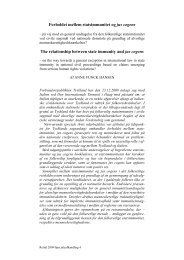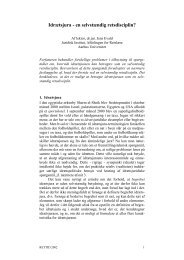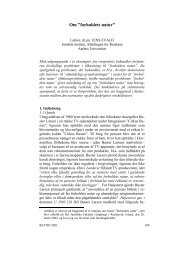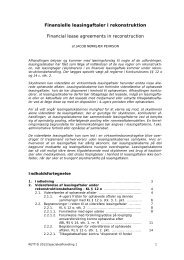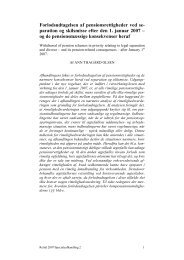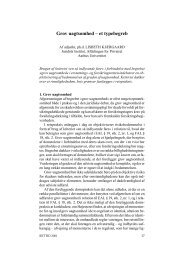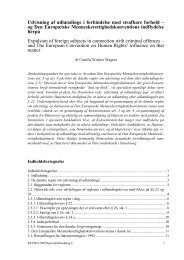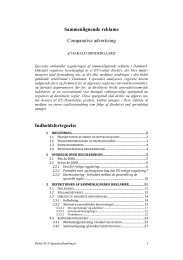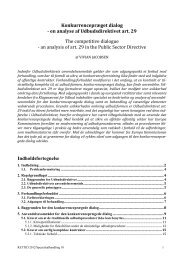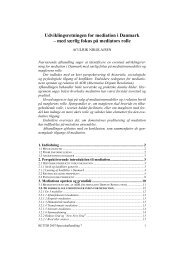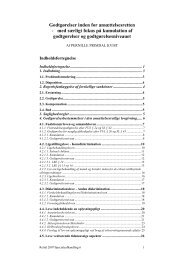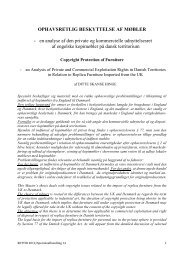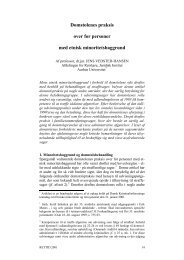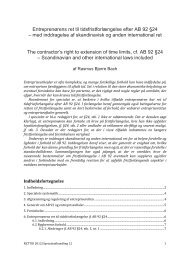Product liability under the CISG and Concurring tort law claims ...
Product liability under the CISG and Concurring tort law claims ...
Product liability under the CISG and Concurring tort law claims ...
You also want an ePaper? Increase the reach of your titles
YUMPU automatically turns print PDFs into web optimized ePapers that Google loves.
Allowing concurring <strong>claims</strong> will have a detrimental effect on <strong>the</strong> Convention. Dismissing concurring <strong>claims</strong><br />
on <strong>the</strong> o<strong>the</strong>r h<strong>and</strong>, will only have a minimum effect on product <strong>liability</strong> <strong>law</strong>s <strong>and</strong> only in situations where a<br />
company suffers damage to property, where <strong>the</strong> notice requirements in art 39 <strong>CISG</strong> have not been fulfilled<br />
<strong>and</strong> where <strong>the</strong> seller has not acted gross negligently. Thus, <strong>the</strong> sacrifices which <strong>the</strong> contracting states have<br />
to make in <strong>tort</strong> <strong>law</strong>, in order to obtain a successful international contract <strong>law</strong>, are limited in this author´s<br />
opinion.<br />
4.6. The effect of negligence<br />
One of <strong>the</strong> greatest differences between <strong>the</strong> Convention <strong>and</strong> domestic <strong>tort</strong> <strong>law</strong> is <strong>the</strong> effect that negligence<br />
is given. While negligence does not influence <strong>liability</strong> according to <strong>the</strong> Convention it is often <strong>the</strong> triggering<br />
effect in domestic <strong>law</strong> which gives rise to a <strong>tort</strong> claim. Whe<strong>the</strong>r <strong>the</strong> very fact that a seller has acted negligently<br />
should automatically make it possible to file a domestic <strong>tort</strong> claim or not, <strong>and</strong> which effect negligence<br />
should be given in Convention regime, will be <strong>the</strong> focus of this section.<br />
Key issues regarding negligence <strong>and</strong> product <strong>liability</strong> were identified by <strong>the</strong> Superior Court of Justice in Ontorio,<br />
Canada in a case from 2003. 140 In this case <strong>the</strong> family Shane, who owned a farm in Ottowa, Canada,<br />
bought a tractor directly from JCB Belgium N.V located in Belgium. The tractor was manufactured in Engl<strong>and</strong>,<br />
where <strong>the</strong> owners of <strong>the</strong> company also resided. After <strong>the</strong> contract had been entered into, <strong>the</strong> Shanes<br />
made agreement to transport <strong>the</strong> tractor to Canada. While being used, <strong>the</strong> tractor caught fire <strong>and</strong> burned<br />
down. The Shanes claimed damages for negligent manufacture <strong>and</strong> design of <strong>the</strong> tractor <strong>and</strong> made <strong>the</strong>ir<br />
claim in Ontario, where <strong>the</strong> damage was suffered. JCB Belgium N.V. disputed jurisdiction.<br />
The parties’ contract was deemed to have been entered into in Belgium, <strong>and</strong> it was not disputed that <strong>the</strong><br />
<strong>CISG</strong> was <strong>the</strong> applicable contract <strong>law</strong>. The essence of <strong>the</strong> claim was, according to <strong>the</strong> Court, determining<br />
what caused <strong>the</strong> tractor to catch fire. However, it was not clear whe<strong>the</strong>r <strong>the</strong> tractor was negligently manufactured<br />
or suffered a defect. Never<strong>the</strong>less, <strong>the</strong> court considered two possibilities as to where <strong>the</strong> <strong>tort</strong> occurred;<br />
in Engl<strong>and</strong>, where <strong>the</strong> tractor was manufactured <strong>and</strong> designed, or in Ontario, where <strong>the</strong> damage<br />
occurred when <strong>the</strong> tractor caught fire <strong>and</strong> burned down.<br />
The court found that “in this case <strong>the</strong> consequences, namely <strong>the</strong> fire destroying <strong>the</strong> tractor occurred in Ontario<br />
<strong>and</strong> <strong>the</strong> <strong>law</strong> of Ontario may well apply to <strong>the</strong> issue of negligent design <strong>and</strong> manufacture of <strong>the</strong> tractor”.<br />
141 Since <strong>the</strong> claim from <strong>the</strong> Shanes was based on negligence <strong>and</strong> not non-conformity <strong>the</strong> claim had <strong>the</strong><br />
closest relation to <strong>tort</strong> <strong>law</strong>, according to <strong>the</strong> court, <strong>and</strong> <strong>the</strong> <strong>law</strong> of <strong>the</strong> place, where <strong>the</strong> damages had occurred<br />
(Ontario <strong>law</strong>), had to be applied. Thus <strong>the</strong> court seized jurisdiction.<br />
The court treated this issue as a breach of a st<strong>and</strong>ard safety expectation ra<strong>the</strong>r than a breach of contract<br />
<strong>and</strong> found <strong>the</strong> interest of <strong>the</strong> injured party more worthy of protection than <strong>the</strong> commercial interests <strong>under</strong>lying<br />
<strong>the</strong> contract. This choice was not based on <strong>the</strong> specific defect <strong>the</strong> tractor suffered or whe<strong>the</strong>r or not it<br />
was manufactured negligently, since such information did not exist, but in stead <strong>the</strong> court viewed it as part<br />
of its discretion to make <strong>the</strong> decision on whe<strong>the</strong>r this was a <strong>tort</strong> claim or a contract claim.<br />
The extent to which <strong>the</strong> <strong>CISG</strong> applies according to art 4 <strong>and</strong> 5, to <strong>the</strong> substantive <strong>and</strong> procedural aspects of<br />
this case, was not discussed by <strong>the</strong> court. The fact that <strong>liability</strong> for damage caused to property is not excluded<br />
by art 5 <strong>CISG</strong> may not have occurred to <strong>the</strong> court, which is an unfortunate omission, since it could<br />
have provided guidance regarding <strong>the</strong> puzzle of concurring <strong>claims</strong>.<br />
140 Shane v. JCB Belgium N.V.<br />
141 Shane v. JCB Belgium N.V. para 42.<br />
RETTID 2012/Specialeafh<strong>and</strong>ling 26 36



